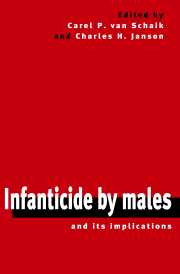Book contents
- Frontmatter
- Contents
- List of Contributors
- Foreword
- Infanticide by males: prospectus
- Part I Introduction
- 1 The holy wars about infanticide. Which side are you on? and why?
- 2 Infanticide by male primates: the sexual selection hypothesis revisited
- 3 Vulnerability to infanticide by males: patterns among mammals
- Part II Infanticide by males: case studies
- Part III Behavioral consequences of infanticide by males
- Part IV Infanticide by females
- Part V Conclusion
- References
- Species index
- Subject index
2 - Infanticide by male primates: the sexual selection hypothesis revisited
Published online by Cambridge University Press: 04 November 2009
- Frontmatter
- Contents
- List of Contributors
- Foreword
- Infanticide by males: prospectus
- Part I Introduction
- 1 The holy wars about infanticide. Which side are you on? and why?
- 2 Infanticide by male primates: the sexual selection hypothesis revisited
- 3 Vulnerability to infanticide by males: patterns among mammals
- Part II Infanticide by males: case studies
- Part III Behavioral consequences of infanticide by males
- Part IV Infanticide by females
- Part V Conclusion
- References
- Species index
- Subject index
Summary
Introduction
The aim of this chapter is to evaluate the evidence for the sexual selection hypothesis for infanticide by male primates, in relation to other hypotheses for this phenomenon. The sexual selection hypothesis emerges largely vindicated. The second part of the chapter then sets the stage for the rest of this book by summarizing observed behavior during episodes of infanticide, the evidence for the decision rules used by males, and the effects of social organization on rates of infanticide by males, and by pointing out some of the remaining difficulties with the hypothesis in its present form.
Critics have repeatedly pointed out that the evidence for infanticide in primates is often circumstantial at best, and that researchers may have jumped to conclusions on the basis of premature extrapolation from snippets of observations (Boggess 1979, 1984; Bartlett et al. 1993; Sussman et al. 1995). This makes it difficult to critically evaluate the hypothesis that a male committing infanticide will on average gain reproductively by doing so. Of course, it has made it equally difficult to evaluate other hypotheses. In this chapter, I therefore evaluate the sexual selection hypothesis for infanticide by males in non-human primates by a careful review of the most appropriate sources of evidence: directly observed cases in wild primates.
The conditions in which male infanticide are expected to raise the male's fitness have been reviewed extensively before (Hausfater & Hrdy 1984).
- Type
- Chapter
- Information
- Infanticide by Males and its Implications , pp. 27 - 60Publisher: Cambridge University PressPrint publication year: 2000
- 112
- Cited by



